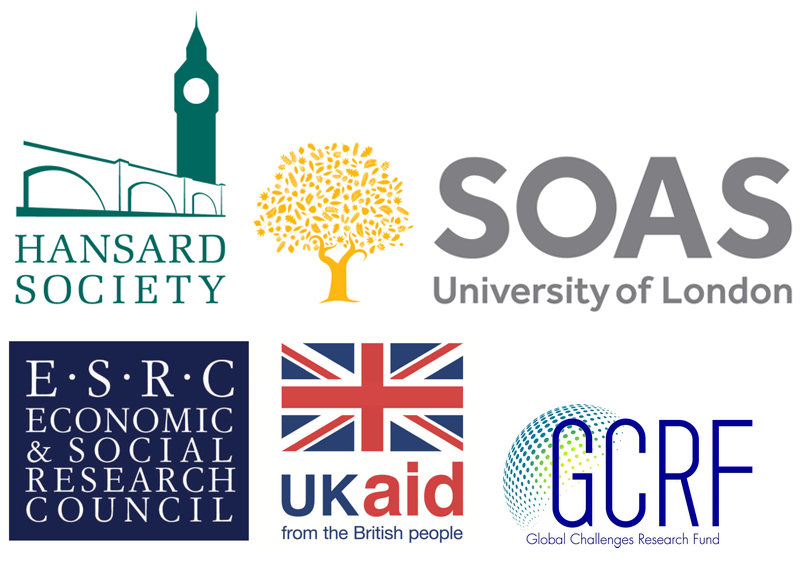Deepening democracy: reconciling parliaments and people through public engagement
Mon. 13 Nov 2017
Join us for the launch of our new Global Research Network on Parliaments and People, with a keynote speech on 'Deepening Democracy' by Baroness Amos.
Get our latest research, insights and events delivered to your inbox
Share this and support our work
We are bringing together scholars from Bangladesh, Ethiopia and Myanmar to learn from their insights on the scrutiny, engagement and representation processes in their parliaments. For the next three years we will be creating opportunities for scholars, politicians, artists and civil society organisations to research, debate and re-imagine politics, and work towards deeper democracy in these and other fragile states. Come to the launch event to help us shape how arts and humanities can contribute to international parliamentary strengthening in the future.
Bringing together the study of politics and development, we will be exploring new ways of working towards more meaningful and inclusive forms of democratic engagement, and how relationships between parliaments and the public they serve can be bridged and strengthened.
Baroness AmosDirector of SOAS and former UN Under-Secretary General for Humanitarian Affairs and Secretary of State for International Development.
Professor Niraja Gopal JayalProfessor, Centre for the Study of Law and Governance, Jawaharlal Nehru University, New Delhi and author of the award winning book, ‘Citizenship and its Discontents: An Indian History’.
Rt Hon Andrew Mitchell MP MP for Sutton Coalfield, former Secretary of State for International Development and government Chief Whip.
Janet Boston Director of Perspective Film Production, producer of the award-winning 'Hands On' global solutions programme for BBC World, and former CEO of the John Smith Trust and the Thompson Foundation.
Greg PowerFounder/Director, Global Partners Governance, author of the first ‘Global Parliamentary Report’ published by UNDP and IPU, and former Special Adviser to the Rt Hon Robin Cook MP and Rt Hon Peter Hain MP.
Professor Emma CreweProfessor of anthropology at SOAS, author of the ‘House of Commons: An Anthropology of MPs at Work’, and chair of international NGO Health Poverty Action.
Myat Thet ThitsarExecutive Director, Enlightened Myanmar Research Foundation, and co-author of ‘Performance analysis of state and regional hluttaws (local legislatures) in Myanmar’.
Professor Nizam AhmedProfessor of Public Administration, Chittagong University, Dhaka, and author of ‘Aiding the Parliament of Bangladesh: Experience and Prospect’ and ‘The Bangladesh Parliament: A Data Handbook’.
Dr Meheret AyenewExecutive Director, Forum for Social Studies, Addis Ababa, and author of ‘Reflections on Development In Ethiopia: New Trends, Sustainability and Challenges’.
Professor Zahir AhmedProfessor of Anthropology, Jahangirnagar University, Dhaka, and author of ‘Anthropology and the Public Sphere in Bangladesh’.
Fatema BasharAssistant Professor, Department of Anthropology, Jagannath University, Dhaka.
Tsedey MekonnenResearcher, Forum for Social Studies, Addis Ababa, specialising in women and politics in Ethiopia.
Dr Mandy Sadan (session chair)Reader in the History of South East Asia, SOAS, and author of ‘Being & Becoming Kachin: Histories Beyond the State in the Borderworlds of Burma’.
Professor Cristina Leston-Bandeira (session chair)Professor of Politics, University of Leeds, author of ‘Parliaments and Citizens’, and member of the Digital Democracy Commission set up by the Speaker of the House of Commons.
9:30am - 1:30pm (including lunch)
Local researchers from Bangladesh, Ethiopia and Myanmar will explore ‘Scrutiny and engagement’ and ‘Representation and exclusion’, bringing together the findings from a three-year DfID/ESRC-sponsored project on ‘Parliaments, public engagement and poverty reduction’.
At the event we will also be launching a new discussion paper exploring how the UK can support national research capacity development in fragile democracies. Drawing on the experience of SOAS and the Hansard Society in working with national researchers in Bangladesh and Ethiopia over the last three years, it will set out:
why policy-makers need to rethink how they understand the relationship between development and politics;
the need for a new Global Research Network on Parliaments and People to support ‘critical friend’ scrutiny of national legislatures;
how scaling-up investment in scholarship, networking and capacity development in the Global South should be at the heart of parliamentary strengthening work.
This session is particularly targeted at academics and practitioners with an interest in democracy, parliaments and governance, especially in fragile states.
2:00 - 5:00pm
Marking the launch of the ‘Global Research Network on Parliaments and People’, Baroness Valerie Amos will give a keynote address on ‘Deepening Democracy’ and the relationship between parliaments and the public in representative democracies around the world. A panel of decision-makers, civil society practitioners and academic researchers will respond to the issues raised.
The session will end with an 'ideas forum' to help inform and shape the development of the Global Research Network which is at the heart of a new three-year project on deepening democracy in politically fragile countries. The project, funded by a £2 million grant from the Arts and Humanities Research Council via the Global Challenges Research Fund, will create opportunities for scholars in politically fragile states to undertake research on the links between ‘Parliament and the People’ and collaborate with arts organisations. It will be co-ordinated by SOAS.
This afternoon session is particularly targeted at parliamentarians, academics, civil society practitioners, journalists, and those working in the arts and humanities with an interest in democracy and political engagement.

parliaments4people.com
Global Research Network on Parliaments and People (GRNPP)More
Related
Journal / Parliamentary Affairs (vol 73, issue 3, 2020)
Articles on themes including the development of Sweden's now 100-year-old parliamentary democracy, strategic voting among Lib Dem supporters in the 2015 general election, policy areas associated with personal attacks at Prime Minister's Questions, UK intergovernmental relations and spending after the Conservative-DUP 'confidence and supply' deal, and more.
Journal / Parliamentary Affairs: special issue on 'Disunity in Parliament' (vol 72, issue 2, 2019)
Articles on topics including House of Commons scrutiny of public appointments, the significance and influence of informal space in legislatures, and gender and media attention in the 2015 UK general election. This special edition issue also contains a collection of articles on the theme of 'disunity in Parliament'.
Blog / Irish Parliament completes legislative preparations for a no-deal Brexit
With Westminster still mired in extraordinary Brexit difficulties, the Irish Parliament (Oireachtas), operating in a much less febrile environment, has concluded its legislative preparations for the possibility of a no-deal Brexit.
Journal / Parliamentary Affairs: special issue on 'Parliamentary work, re-selection and re-election' (vol 71, issue 4, 2018)
This special issue of Parliamentary Affairs brings together comparative research across European legislatures to see how much influence MPs' day-to-day legislative and scrutiny work has on voters when they head to the polls. This issue also includes then-Commons Speaker John Bercow's 2016 Bernard Crick Lecture, 'Designing for Democracy'.
Journal / Parliamentary Affairs: special issue on 'The 2017 French presidential and parliamentary elections' (vol 71, issue 3, 2018)
To mark the 2017 French parliamentary and presidential election, this special issue of Parliamentary Affairs looks at the realignment of French politics and revival of the presidency, the demise of the Left, and how policy choices for the Front National influenced its electoral success.
Blog / Bridging representative and direct democracy? Ireland's Citizens' Assemblies
How did Ireland get to its 25 May 'repeal the 8th' constitutional referendum on abortion? The process has innovatively blended participatory, deliberative, representative and direct forms of democracy.
Journal / Parliamentary Affairs: special issue on 'Twenty years after the Good Friday / Belfast Agreement' (vol 71, issue 2, 2018)
To mark 20 years since the signing of the Belfast Agreement, this special issue of Parliamentary Affairs explores a range of critical topics surrounding the event, including the sustainability of peace, why politicians should question the utility of one-sided assetions of the past, and the impact of the Agreement on women's rights.
Blog / A guide to the Parliament of Ethiopia, by Meheret Ayenew and Tsedey Mekonnen
Meheret Ayenew, Executive Director of the Forum for Social Studies in Addis Ababa, and researcher Tsedey Mekonnen set out the history, make-up and role of the bicameral Ethiopian Parliament.
Blog / How research is contributing to Bangladesh's development improvements, by Zahir Ahmed
Earlier this month the Impact Initiative brought Bangladeshi development leaders together with researchers focused on the country, to explore what has made Bangladesh’s development so successful, and the role that research has played in this success.
Blog / A new generation get the key to the Dáil
Ireland’s 32nd parliament met for the first time on 10 March 2016 following a general election which returned a highly-fragmented party system and failed to offer an obvious coalition government option.
Latest
Guides / Financial Scrutiny: the Budget
In order to raise income, the government needs to obtain approval from Parliament for its taxation plans. The Budget process is the means by which the House of Commons considers the government’s plans to impose 'charges on the people' and its assessment of the wider state of the economy.
Guides / Financial Scrutiny: the Estimates Cycle
In order to incur expenditure the government needs to obtain approval from Parliament for its departmental spending plans. The annual Estimates cycle is the means by which the House of Commons controls the government’s plans for the spending of money raised through taxation.
Data / Coronavirus Statutory Instruments Dashboard
The national effort to tackle the Coronavirus health emergency has resulted in UK ministers being granted some of the broadest legislative powers ever seen in peacetime. This Dashboard highlights key facts and figures about the Statutory Instruments (SIs) being produced using these powers in the Coronavirus Act 2020 and other Acts of Parliament.
Briefings / The Economic Crime (Transparency and Enforcement) Bill: four delegated powers that should be amended to improve future accountability to Parliament
The Bill seeks to crack down on ‘dirty money’ and corrupt elites in the UK and is being expedited through Parliament following Russia’s invasion of Ukraine. This briefing identifies four delegated powers in the Bill that should be amended to ensure future accountability to Parliament.
Articles / Brexit and Beyond: Delegated Legislation
The end of the transition period is likely to expose even more fully the scope of the policy-making that the government can carry out via Statutory Instruments, as it uses its new powers to develop post-Brexit law. However, there are few signs yet of a wish to reform delegated legislation scrutiny, on the part of government or the necessary coalition of MPs.